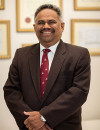I initially heard about the MasterClass course when I was doing my training in Sheffield. After I came over to Australia I applied to take part as a Consultant.
The educational highlight for me was the course’s clear structure. I’ve been looking after Parkinson’s patients since 1997; this was the first structured course on Parkinson’s Disease that I have attended; it was very useful in that sense, as well as experienced colleagues passing on their knowledge.
Learning is an ongoing process, and for me it started at the MasterClass and continues to carry on because Parkinson’s disease is one of the most complex diseases to learn because of its diverse manifestations. The MasterClass was the beginning of that process.
I attended the MasterClass around the time I commenced a Parkinson’s Disease Service for Older Persons. The course definitely assisted me in laying the foundation for setting up this service.
Dr Peter Fletcher has a unique approach to teaching and his teachings have gone a long way in moulding and developing my skills as a Geriatrician with a special interest in Parkinson’s disease.
The course has influenced my thought process when I assess a patient. The MasterClass helped in designing a very structured approach in assessing people with Parkinson’s, especially the non-motor symptoms.
Our service covers half a million people, over an area larger than England, which presents some unique challenges. Delivering education on Parkinson’s disease to non-movement disorder specialist teams caring for patients with Parkinson’s is an integral part of my service. This is delivered in the form of an eight week Parkinson’s disease programme conducted at our Day Hospital for patients and carers, in-service teaching for medical, nursing and allied health staff in the wards and teaching of nursing staff in age care facilities in rural areas.
Engaging the patients and carers is another integral aspect of our service. Myself and my team at the Day Hospital regularly attend Parkinson’s disease support meetings and offer our support and expertise. I have organised a Public Forum for the Parkinson’s community which was attended by over 300 people and the educational sessions were well received.
I have also designed a teaching tool to improve knowledge and awareness regarding Parkinson’s medications. The “PD Pill” project is a multimedia educational tool that explains how every single Parkinson’s medication works. Regular sessions using the “PD Pill” are held in multiple health care facilities across the John Hunter Hospital. Patients, carers and health care staff at hospitals and aged care facilities have found this extremely useful. After my presentation at King’s College London, “PD Pill” is being used by the King’s Parkinson’s service as well.
We circulate a non-motor symptoms (NMS) questionnaire (NMS QUEST) to patients and their carers with the message that next time they are seeing their GP they need to discuss their NMS symptoms. This has led to an increased awareness of NMS symptoms amongst patients and carers and among the primary health care staff also.
In 2014, I organised a Parkinson’s Disease Masterclass; it was the first ever teaching class in Australasia endorsed by the International Parkinson and Movement Disorder Society. Leading clinicians in the field of Parkinson’s formed the Faculty.
Attended by 150 people, the masterclass had a mixed audience, including General Medicine consultants, Consultant Geriatricians, Specialist Registrars, General Practitioners, Parkinson’s disease Nurse Specialists and members of the multidisciplinary team. The masterclass was widely appreciated.
The masterclass aside, collaboration is very important to us. We are proud to be associated with the King’s College London Centre of Excellence in Parkinson’s team led by Professor Ray Chaudhuri.
Presentations and publications at various international Parkinson’s conferences is a regular feature of our service.
I can confidently say that the foundation for this clinical service was laid at the Parkinson’s Academy Masterclass that I attended in 2009.
